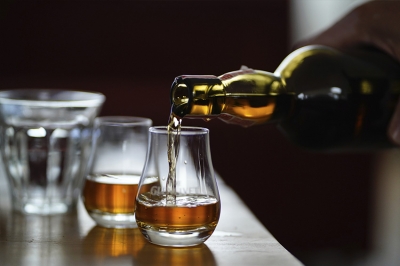Increasingly gaining space among people seeking a healthy lifestyle, kombucha is a slightly sweet and acidic drink obtained from the fermentation of Camellia sinensis tea and a symbiosis of bacteria and yeast.
It is believed to have originated in northeast China, where it was prized for its purported health benefits. With the expansion of trade routes, it began to migrate to the rest of the world, becoming popular in other countries, such as Korea, Japan, Russia and Germany. But it was from the 1960s onwards that the habit of consuming fermented drinks became even more popular in Europe and, nowadays, kombucha is marketed all over the world.
Several factors can influence kombucha fermentation, such as temperature, pH, oxygen, substrate, sugar concentration, fermentation time, among others (1,2). During the fermentation process, the flavor changes until it becomes sweet and sparkling. The process lasts for 14 days, after which the drink may taste like sour vinegar.
Is Kombucha alcoholic?
Several metabolic reactions occur during the fermentation process leading to the formation of secondary metabolites originating from the substrate used for its production. The main compounds formed in the beverage are organic acids, ethanol, sugars, vitamins and minerals. Among these compounds, ethanol has been the focus of attention.
Normally, if the production and storage processes are adequate, the drink should not have an alcohol content of more than 0.5%. However, some international studies were made with samples of kombucha that showed that the drink can exceed this alcohol content. Researchers evaluated the fermentation biochemistry of green and black tea kombucha, for example, under different temperature conditions (20, 25 and 30◦C) and found that, after 10 days of fermentation, at all temperatures analyzed, the ethanol was higher than 0.5% (v/v), reaching a maximum of 1.1% at 25◦C (3).
In Brazil, as in the United States, the maximum ethanol limit for non-alcoholic beverages, including kombucha, is 0.5%. This limit cannot be exceeded at any stage of its production or during the storage period until consumption. If a product has an alcohol content above 0.5%, it must be classified as an alcoholic beverage, subject to regulation. In addition, the Identity and Quality Standard (PIQ) of this drink is regulated by the Normative Instruction number 47, of September 17, 2019, from the Ministry of Agriculture, Livestock and Supply, which monitors definitions, composition, classifications, labeling description, prohibitions and analytical parameters. These parameters include pH between 2.5–4.2, alcohol content of kombucha without alcohol (up to 0.5%) and with alcohol (0.6–0.8%), among others (1,2).
Regarding the alcohol content limit, if the fermentation process is not properly controlled, alcohol production can be increased. Sugar concentration, storage conditions, fermentation time and temperature are factors that can influence the ethanol concentration in kombucha. Because of this variability, it is possible for kombucha to reach concentrations greater than 0.5% alcohol content. In the United States, in 2010, there was a recall of products that exceeded this limit (2). Likewise, in Australia, according to a document published by the Department of Health of the Australian Government, in recent years, some samples of kombucha had an alcohol content above 0.5% (v/v) and this information was not displayed in their labels (4).
Although for most people ethanol concentration above 0.5% does not cause problems, it is worth remembering that for some populations, such as pregnant women, under 18 years old, people with health problems (hypertension, liver diseases, cancer, psychiatric disorders, among others) and continuous use of medication, consumption is not recommended, since the recommendation for these groups is zero alcohol.
Health benefits
Currently, the drink is sold worldwide in several flavors, mainly as a potentially functional drink. Several benefits are attributed to kombucha, which made it even more popular, such as nutritional properties, antioxidant, antimicrobial, antidiabetic and anticancer effects. However, the scientific literature still needs more clinical studies to prove these benefits in humans.
Despite the drink's potential therapeutic effects, there are also concerns about its toxicity and possible harm to health, particularly for immunocompromised individuals. Research shows the occurrence of dizziness, nausea, vomiting, allergic reactions, jaundice, headache and neck pain after consuming kombucha.
The mechanisms associated with the adverse effects of its consumption are still unclear, but microbiological composition, storage conditions, and chemical composition of tea are some of the factors that may contribute to such effects.


